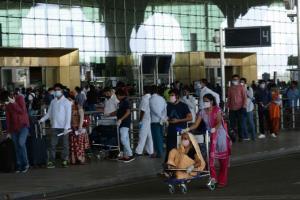Experts have said that without a vaccine to give people immunity, infections could increase again when social-distancing measures are relaxed

This picture has been used for representational purpose only
Countries could see a "second peak" of coronavirus cases during the first wave of the pandemic if lockdown restrictions were lifted too soon, the World Health Organization (WHO) has warned. Mike Ryan, the WHO's head of emergencies, told a briefing on Monday that the world was "right in the middle of the first wave", the BBC reported. He said because the disease was "still on the way up", countries need to be aware that "the disease can jump up at any time".
ADVERTISEMENT
Countries could see a "second peak" of #coronavirus cases during the first wave of the pandemic if #lockdown restrictions were lifted too soon, the World Health Organization (@WHO) has warned.#COVID__19 #CoronaPandemic pic.twitter.com/CYxoHsboyg
— IANS Tweets (@ians_india) May 26, 2020
"We cannot make assumptions that just because the disease is on the way down now that it's going to keep going down," Ryan said. There would be a number of months to prepare for a second peak, he added. The stark warning comes as countries around the world start to gradually ease lockdown restrictions, allowing shops to reopen and larger groups of people to gather.
Experts have said that without a vaccine to give people immunity, infections could increase again when social-distancing measures are relaxed. Ryan said countries where cases are declining should be using this time to develop effective trace-and-test regimes to "ensure that we continue on a downwards trajectory and we don't have an immediate second peak".
Mike Ryan(@DrMikeRyan), the #WHO's head of emergencies, told a briefing that the world was "right in the middle of the first wave", the BBC reported.
— IANS Tweets (@ians_india) May 26, 2020
He said because the disease was "still on the way up", countries need to be aware that "the disease can jump up at any time". pic.twitter.com/Nl2kXNyrsv
Also on Monday, Tedros Adhanom Ghebreyesus, WHO Director-General, said that a clinical trial of hydroxychloroquine (HCQ) on COVID-19 patients has come to "a temporary pause", while the safety data of the the anti-malaria drug was being reviewed.
According to the WHO chief, The Lancet medical journal on May 22 had published an observational study on HCQ and chloroquine and its effects on COVID-19 patients that have been hospitalized, reports Xinhua news agency.
The authors of the study reported that among patients receiving the drug, when used alone or with a macrolide, they estimated a higher mortality rate. "The Executive Group of the Solidarity Trial, representing 10 of the participating countries, met on Saturday (May 23) and has agreed to review a comprehensive analysis and critical appraisal of all evidence available globally," Tedros said in a virtual press conference.
The developments come as the total number of global COVID-19 cases has increased to 5,508,904, with 346,508 deaths, according to the Johns Hopkins University.
Catch up on all the latest Crime, National, International and Hatke news here. Also download the new mid-day Android and iOS apps to get latest updates.
Mid-Day is now on Telegram. Click here to join our channel (@middayinfomedialtd) and stay updated with the latest news
This story has been sourced from a third party syndicated feed, agencies. Mid-day accepts no responsibility or liability for its dependability, trustworthiness, reliability and data of the text. Mid-day management/mid-day.com reserves the sole right to alter, delete or remove (without notice) the content in its absolute discretion for any reason whatsoever
 Subscribe today by clicking the link and stay updated with the latest news!" Click here!
Subscribe today by clicking the link and stay updated with the latest news!" Click here!







